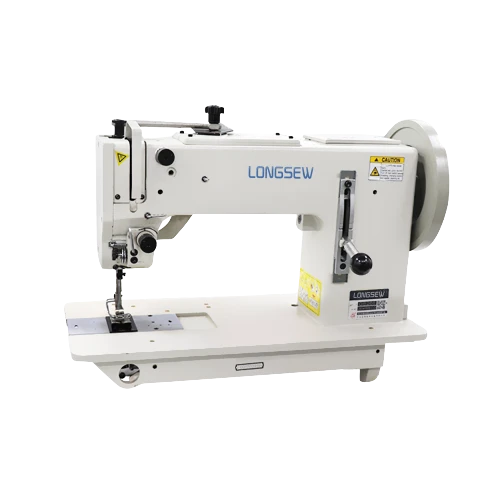sewing machine for thick materials
Sewing Machines for Thick Materials A Comprehensive Guide
When it comes to tackling sewing projects involving thick materials, having the right sewing machine is crucial. Whether you're working with heavy fabrics like denim, canvas, leather, or multiple layers of fabric, a regular sewing machine may not suffice. In this article, we will explore the features, types, and best practices for choosing a sewing machine that can handle thick materials effectively.
Understanding the Needs of Thick Materials
Thick materials present unique challenges for sewing machines. The primary concerns include needle breakage, fabric bunching, skipped stitches, and inconsistent tension. Thick fabrics require a machine with ample power and specialized features that ensure smooth operation and precise stitching. Before making a purchase, it is essential to understand the specific requirements for your projects and the types of materials you plan to work with.
Key Features to Look For
When selecting a sewing machine for thick materials, consider the following key features
1. Powerful Motor A sewing machine with a powerful motor can handle heavier fabrics without stalling. Look for machines with at least 1.0 amp motor strength to ensure they can manage the resistance of thick materials.
2. Walking Foot A walking foot (or even feed foot) is invaluable for working with thick fabrics. This attachment helps move multiple layers of fabric evenly under the needle, reducing the risk of bunching or shifting.
3. Needle Size and Type The right needle is crucial when sewing thick materials. Look for machines that accommodate heavy-duty needles, such as size 16 or 18 needles. Additionally, consider using specialty needles designed for leather or denim when working with those specific fabrics.
4. Presser Foot Pressure Adjustment Being able to adjust the presser foot pressure allows you to apply more or less pressure to the fabric, depending on its thickness. This feature is essential for achieving consistent stitching without damaging the material.
5. Stitch Options Look for machines that offer a variety of stitch options, including straight, zigzag, and decorative stitches. This versatility allows for creative projects and gives you greater control over the final outcome.
6. Durability and Build Quality Since thick materials can be tough on machines, opting for a heavy-duty model with a robust metal frame is wise. These machines are built to withstand the strain of sewing through multiple layers of fabric.
sewing machine for thick materials

Types of Sewing Machines for Thick Materials
1. Heavy-Duty Sewing Machines These machines are specifically designed for tough tasks. Brands like Singer and Brother offer models that can sew through multiple layers of denim, canvas, and leather, making them ideal for quilting and upholstery projects.
2. Industrial Sewing Machines If you are a professional or regularly work on heavy-duty tasks, industrial sewing machines may be the answer. While these machines can be an investment, they are built for continuous use and can handle large volumes of thick materials with ease.
3. Upholstery Sewing Machines Tailored for working with upholstery fabrics and leathers, these machines come equipped with features that allow them to handle thick seams and heavy layers, making them perfect for furniture projects.
Best Practices for Sewing Thick Materials
Once you have selected an appropriate sewing machine, consider these best practices
1. Use the Right Supplies Invest in high-quality threads designed for heavy fabrics, as these will provide better strength and reduce the likelihood of breakage.
2. Prepare Your Fabric Before sewing, ensure that the edges of the fabric are finished to prevent fraying. Clip or pin layers together to prevent shifting as you sew.
3. Sew Slowly and Steadily When working with thick materials, it's crucial to sew slowly to maintain full control over the fabric and allow the machine to handle the thickness without strain.
4. Test Stitches Always test your stitching on a scrap piece of the same fabric before starting on your main project. This will help you determine the appropriate tension and stitch settings.
Conclusion
Choosing the right sewing machine for thick materials can significantly impact the quality and ease of your sewing projects. By understanding the unique demands of thick fabrics and investing in a machine equipped with the right features, you can expand your sewing capabilities and achieve professional results in your home studio. Whether you’re an adventurous seamstress tackling new projects or a seasoned professional, a reliable sewing machine is an essential tool for success.
-
Heavy Duty Leather Sewing Machine: A Must-Have for Professional LeatherworkNewsMay.28,2025
-
Leather Sewing Machine: Essential for High-Quality LeathercraftNewsMay.28,2025
-
Extra Heavy Duty Sewing Machine for Premium Leather ApplicationsNewsMay.28,2025
-
Walking Foot Cylinder Arm Sewing Machine: Precision and Power CombinedNewsMay.28,2025
-
Industrial Cylinder Arm Sewing Machine: Engineered for High-Performance StitchingNewsMay.28,2025
-
Cylinder Bed Sewing Machine: A Powerful Solution for Precision StitchingNewsMay.28,2025
-
Zigzag Sewing MachineNewsMay.12,2025





























